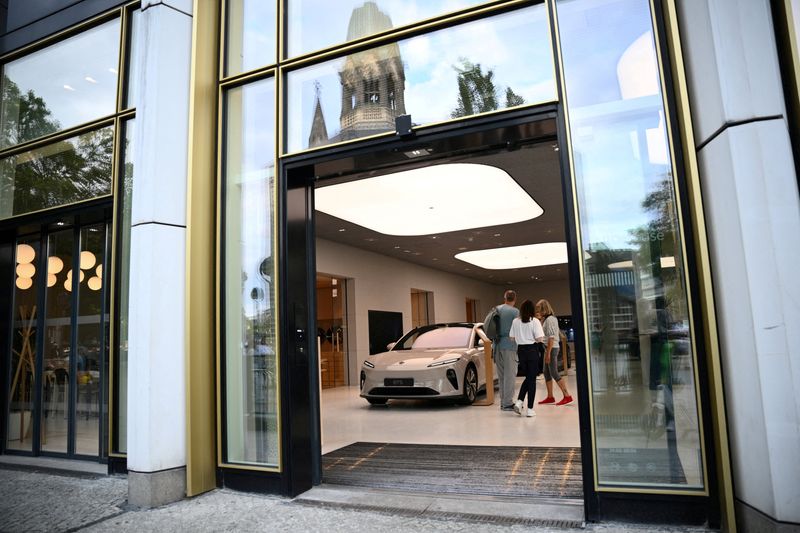By Reinhard Becker and Sarah Marsh
BERLIN (Reuters) - Imports of Chinese vehicles and parts to Germany jumped 75% in the first half of the year while trade the other way slumped, showing the mounting pressure on Europe's biggest auto production hub.
Several Chinese brands entered the German market this year, the German Economic Institute (IW) said in a report seen ahead of publication by Reuters, bringing the total to eight, though they still account for just 1.5% of vehicles sold in the country.
Cars made in China by non-Chinese brands, such as the all-electric iX3 from Germany's BMW (ETR:BMWG)'s, also contributed to the rise in imports.
The study comes days after the European Commission launched an investigation into whether to impose punitive tariffs to protect EU producers against cheaper Chinese electric vehicle (EV) imports it says benefit from state subsidies.
It also shows exports of German vehicles and parts to the world's second-largest economy slumped 21% in the first half of the year, accounting for three quarters of the total decline in exports to China of over 8%.
"The business model that used to support car production in Germany - the intercontinental export of high-quality vehicles - is coming under increasing pressure," wrote study authors Juergen Matthes and Thomas Puls.
"German manufacturers have been relocating more and more production to China for years, currently also increasingly in the previously resistant premium class."
More broadly, vehicles are increasingly becoming an Asian product, with nearly 60% of all vehicles produced in an Asian country last year, compared with around 31% in 2000, they wrote.
Europe is losing significance for the sector, with only Germany and Spain among the top ten auto producers worldwide, which in 2000 included also France, Britain and Italy.
German automakers' early entry into the Chinese market in the 1980s is to thank for their relative resilience, the IW said.
IS DERISKING BEGINNING?
Germany has at times been seen as a weak link in Western attempts to decouple from China, given Berlin's strong business ties with the Asian superpower which became Germany's single biggest trade partner in 2016.
But Germany has over the past year joined the broader push to reduce dependence on China - which its policymakers have dubbed "de-risking".
The IW study, entitled "Is Derisking Beginning?", said a breakdown of the broader 17% drop in German imports from China in the first half of the year pointed to the first signs of a reduction of Germany’s reliance on China.
Some 70% of product groups with a relatively high value where China traditionally accounts for more than half of imports saw a decline in China's market share. And just under 16% of such product groups saw declines in China's import share of more than 20 percentage points, the study showed, without naming the product areas or giving the exact market shares.
But the chemicals sector alone accounted for 14 percentage points of the total decline in imports.

It is too early to draw clear conclusions from the data about derisking, IW said, adding authorities needed to make more data available.
“We urgently need information about which products are indispensable, what role they play in firms’ supply chains and whether they could be replaced in sufficient supply and a short timeframe by other countries or production at home,” it said.